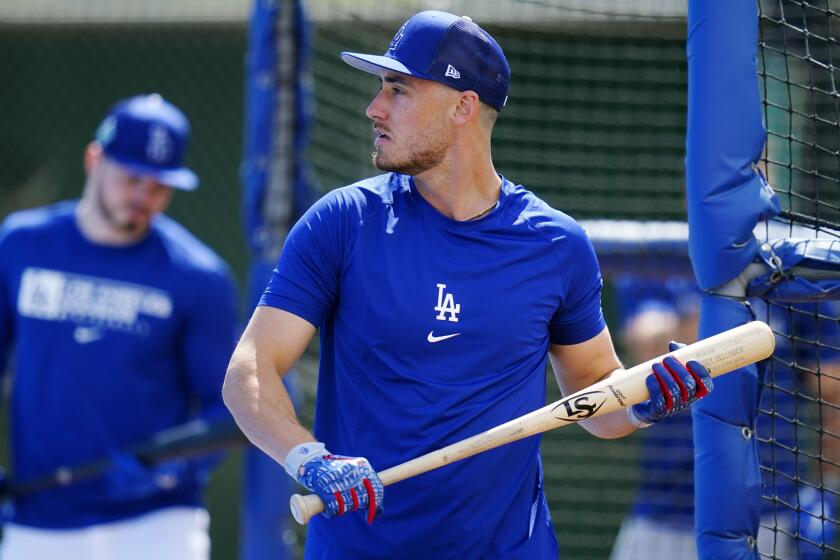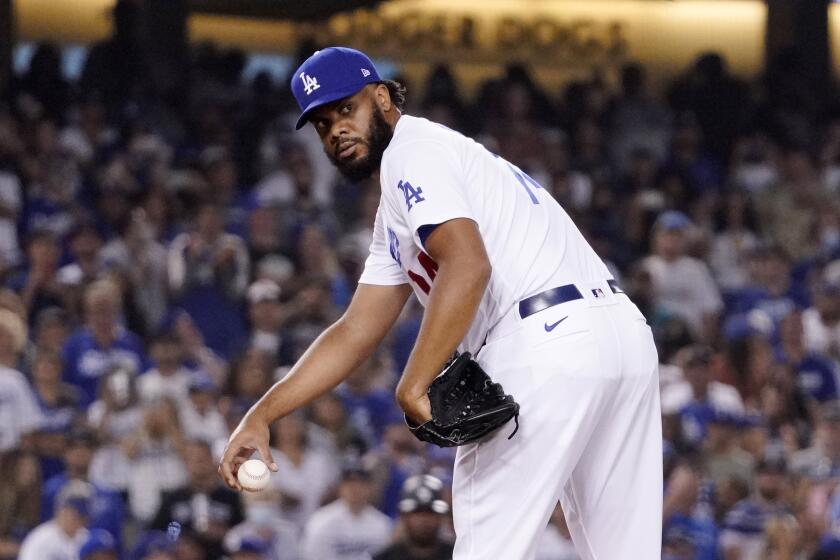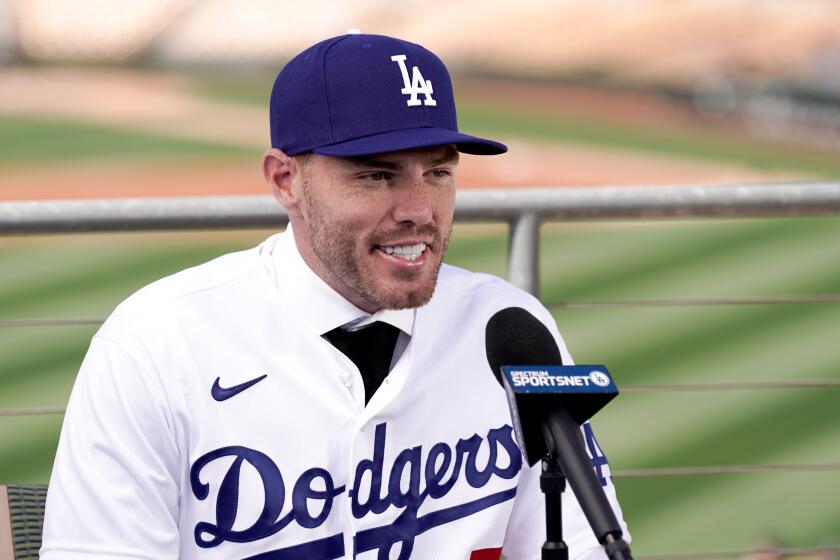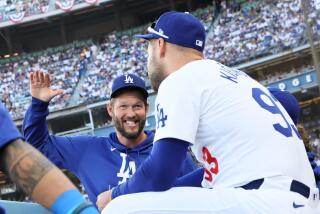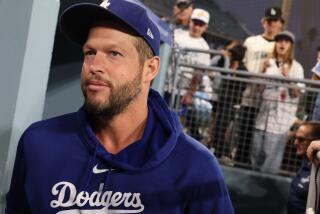Column: Dodgers’ Clayton Kershaw has pitched a lot of innings. He doesn’t regret any of them
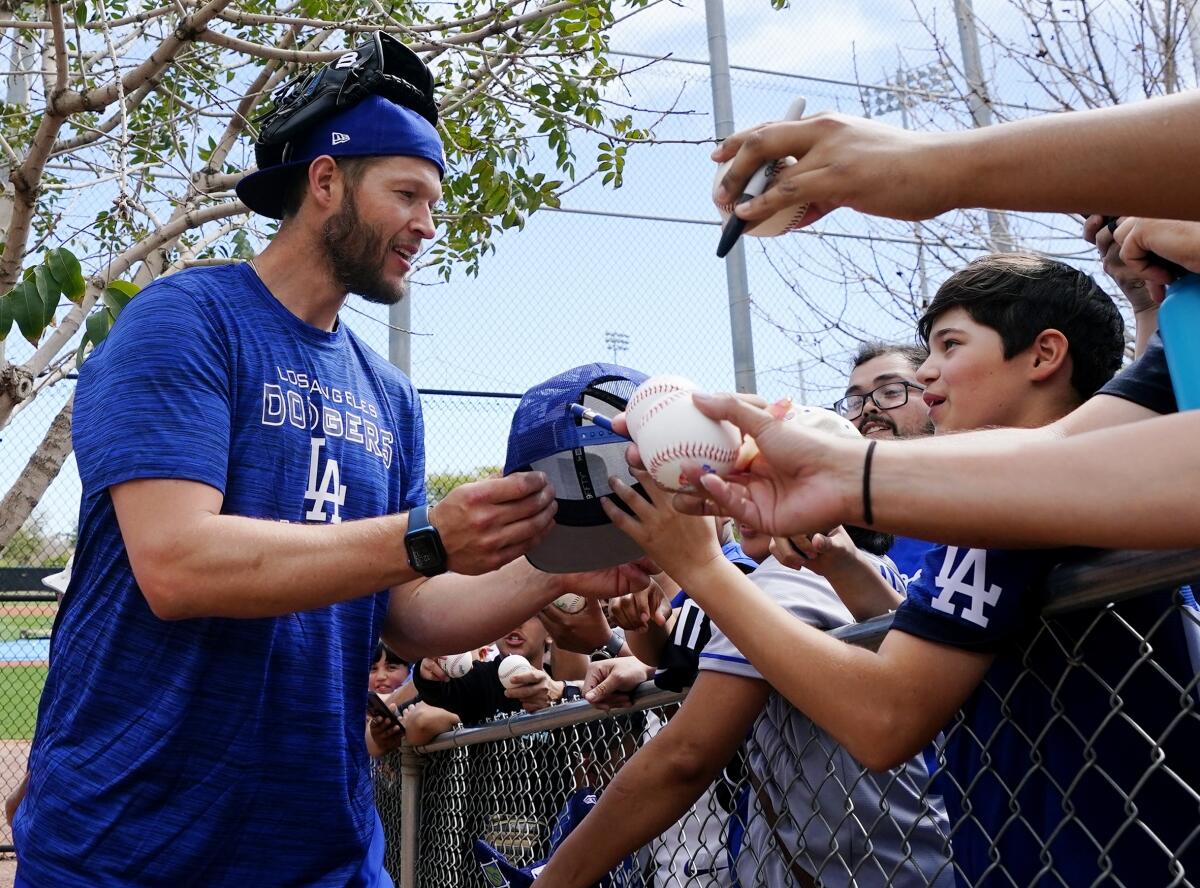
- Share via
PHOENIX — When the former team official reflects on his time with the Dodgers, he often thinks of the burdens they placed on Clayton Kershaw.
More than once this winter, the baseball industry veteran contemplated the postseason games Kershaw started on three days’ rest. He recalled what was demanded of Kershaw in the early stages of a season that followed a particularly exhausting playoff run.
“We really ran him into the ground,” the remorseful ex-employee said.
Standing by his locker in the Dodgers’ spring training facility, Kershaw listened as these concerns were relayed to him by a third party.
“I guess your question is,” Kershaw said, “if I would have protected myself more, do you think I would be less hurt and have more time in the future?”
Without any pause or hesitation, Kershaw continued, “Even if that was true, I wouldn’t change anything.”
Of course he wouldn’t.
Dodgers outfielder Cody Bellinger has massively struggled on offense the last two seasons. But he’s healthy again and ready to regain his MVP form.
The mindset could be responsible for numerous visits to the injured list and millions in lost wages, but it is also a reason Kershaw is the franchise’s most admired player of the last decade.
Kershaw, 34, reported to camp this month saying he was completely recovered from the elbow and forearm problems that limited him to 22 starts and sidelined him for the entire postseason last year. His claims have passed the early eye tests.
But he’s landed on the injured list six times over the last four years and is now seven years removed from his most recent 200-inning season.
His medical history factored in to a significant reduction in pay. Kershaw, who earned $31 million last year, returned to the Dodgers on a one-year, $17-million contract. Max Scherzer, who is three years older but considered to have a healthier arm, signed a three-year, $130-million deal with the New York Mets.
The simplest explanation for Kershaw’s recent elbow, shoulder and back troubles is the one offered by the former executive: Kershaw pitched too much when he was at the height of his powers.
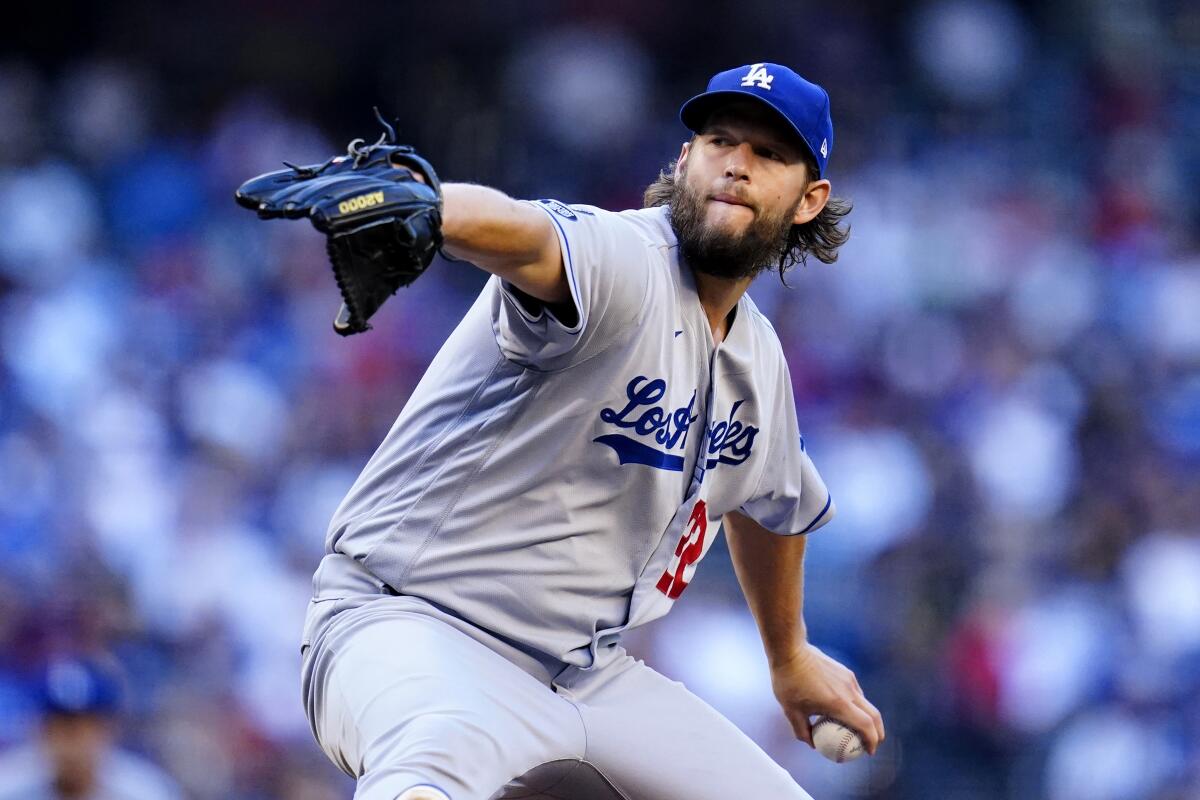
However, Kershaw insisted, “I wouldn’t change it for the world. I did what I think the team needed me to do.”
The first time he pitched 200 innings in a season was in 2010, when he was only 22.
Over the next five years, he pitched more than 227 innings four times. In 2014, the only regular season over that stretch in which he failed to reach the 200-inning mark, he returned from an early-season back injury to pitch 198 1/3 innings. He was the National League’s most valuable player and Cy Young Award winner that year.
Kershaw made postseason starts on three days’ rest in each of the four years from 2013 to 2016. He pitched the final inning of the 2016 NL Division Series against the Washington Nationals and threw four innings of relief in Game 7 of the 2017 World Series against the Houston Astros.
“I don’t have any regrets of what I did, whether it be the short rest or the bullpens or the different things like that,” Kershaw said. “At the end of the day, for the team to count on you and want you to go out there and do it, that’s a huge honor. They paid me a lot of money too.
“I wouldn’t change it for the world. I did what I think the team needed me to do.”
— Clayton Kershaw
“Looking back on it, the only thing I’d say is I wish I’d pitched better.”
Kershaw endured crushing defeats to the St. Louis Cardinals in consecutive seasons. He was rocked by the Chicago Cubs in an elimination game in 2016. He failed to hold separate four- and three-run leads in Game 5 of the World Series against the Astros, who were later revealed to be using video technology to steal signs.
Was he proud to have attempted what he did?
“I don’t know if proud is the right word,” Kershaw said. “The participation trophy doesn’t do it for me. At the end of the day, I would have been proud if we won. If our team thinks I’m the best option to go win the game, I’ll do it. I take pride in that. I take pride in your team and your management, everybody thinking you’re the right guy for that.”
Kershaw isn’t entirely convinced his workload was responsible for his subsequent injuries.
“You just don’t know with pitchers,” he said. “You look at Adam Wainwright, we kind of thought, he had Tommy John [surgery], he had the Achilles thing and last year he threw the most innings in baseball, or close to it. (Wainwright’s 206 1/3 innings were third-most in the majors.)
Kenley Jansen grew up rooting for the Atlanta Braves. When they made him an offer and the Dodgers asked him to wait, he decided to go with his boyhood favorite.
“And then there are some guys that are so big and so strong and throw so hard and they haven’t pitched a full season in a while.”
Kershaw said he was glad to have broken in to the majors when he did, as frontline pitchers today are rarely offered the level of responsibility the Dodgers used to give to him. He also said he understood why teams are doing what they’re doing.
He offered the hypothetical example of a team that started Mets ace Jacob deGrom and had Dodgers right-hander Blake Treinen in the bullpen.
“Blake Treinen might be the best one-inning pitcher in baseball,” Kershaw said. “If [deGrom is] in the eighth inning and he’s faced those guys twice or three times, even though it’s Jacob deGrom, Blake Treinen might be better.”
Which isn’t to say Kershaw is resigned to a future in which the value of starting pitching remains diminished.
“The starter part of me thinks that there’s still a need and a value for it,” he said. “Everybody’s talking about what you can do to make the game faster. For me, it would be just limit how many relievers you could have. If you limit the number of relievers you can have, the starters are going to have to go deeper. At the end of the day, I do think that starters make the game, in some aspects. Like, when you see Jacob deGrom versus Corbin Burnes, I want to watch that on TV.”
An inside look at how the Dodgers signed All-Star first baseman Freddie Freeman, including an impromptu call from Mookie Betts’ wedding.
Kershaw also remained upbeat about his own future.
“I wouldn’t have come back if I didn’t think I was healthy,” he said. “I also didn’t want to come back as a ‘We just want you here to tip your cap.’ I don’t want any part of that. I’m going to contribute. Obviously, Walker [Buehler] and Julio [Urías] had better years and they’re going to be the guys and that’s great.”
The key for Kershaw will be to remain healthy. His ERA was 3.25 through his first 17 starts last year. When he wasn’t injured, he pitched well.
“I still plan on doing that,” he said.
Just as he did in his previous 14 seasons, he’s waiting for the Dodgers to call his name. And just as he did in his previous 14 seasons, his desire to answer that call is bound to overwhelm whatever instinct he has to play it safe.
More to Read
Are you a true-blue fan?
Get our Dodgers Dugout newsletter for insights, news and much more.
You may occasionally receive promotional content from the Los Angeles Times.

